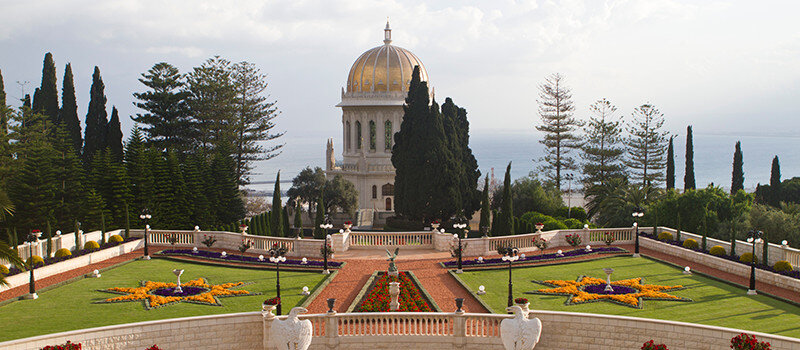The Báb: No Unity Without Sacrifice
The Shrine of the Báb on Mount Carmel in Haifa, Israel (bahai.org)
October 12, 2019
On October the 29th 2019, Bahá’ís around the world will celebrate the bicentenary of the birth of the Báb. This is, on the face of it, rather interesting, because the Báb is not (technically) a part of the Bahá’í Faith.
The founder of the Baha’i Faith is Bahá’u’lláh, who Bahá’ís look to in largely the same way that Christians do to Jesus and Muslims do to Muhammad. If you were friends with a Bahá’í, chances are you were invited (politely but probably persistently, as is the Bahá’í way) to celebrate the bicentennial of Bahá’u’lláh’s birth this time two years ago.
So, why are we celebrating the birth of the Báb in much the same way?
Bahá’ís believe that the Báb was a Manifestation of God — that it, someone sent by God to manifest His qualities in this earthly realm and deliver His guidance to us earthly creatures. This sounds like the same thing as a prophet — ordinary men chosen by and called upon by God to perform special deeds — and, well, it largely is. Although it is better understood as a progression of this concept; as best as I am able to explain it: a Manifestation of God doesn’t just converse with God, but has the essence of God within them. While human in form, they are divine in nature.
Abraham and Moses are also understood in general terms as biblical Manifestations, although clearly they aren’t on the same level as Jesus in terms of the divinity of their character. Hence, for Christians, Jesus is the best comparison to understand how Bahá’ís perceive the station of the Báb (and Bahá’u’lláh), as controversial as that might be seen by many.
Looking at the life, albeit short, of the Báb, one can witness a divine character, not just a character in touch with the divine: intellectually He was an incredibly precocious child, with no need for formal education; His religious knowledge of the Qur’an put supposed Islamic scholars in the shade; He wrote an astonishing amount in a short period of time; and, perhaps most tellingly, through His word and character, He inspired a fanatical devotion in His followers.
There is, however, something absolutely unique about the station of the Báb in the history of religious figures. While he was a divine Manifestation — a true mouthpiece of God just like Moses, Jesus and Muhammad before him, and Bahá’u’lláh after Him — He has no religious legacy to show for it. No obvious and existing one at least. He did have a religion — the Bábi Faith — and His own devoted followers — the Babi’s, however both His faith and followers are to all intents and purposes extinct.
But this hides the actual legacy of the Báb: there would be no Bahá’í faith without Him.
Persia circa 200 years ago was a shockingly immoral cultural wasteland. As described in this article:
“A population ignorant, apathetic, and superstitious in the extreme was the prey of a profoundly corrupt Muslim clergy and the brutal regime of the Qájár shahs. Shí‘ih Islam had, for the most part, degenerated into a mass of superstitions and mindless legalisms. Security of life and property depended entirely on the whims of those in authority.”
It was the role of the Báb to shake the foundations of this culture in such a way that a second Manifestation could then arise in its wake. That is why he was called the Báb: the Báb means the Gate, and He was the gate that opened to humanity the way out of this mess that we find ourselves in, which Bahá’ís believe is the teachings of Bahá’u’lláh.
There is however more to the life of the Báb then as just a stepping stone to the Bahá’í religion.
Each religious Manifestation has made their own unique contribution to the advancement of humanity. This has been achieved by radically reviving particular spiritual virtues that were essentially absent at that time, and would thus be especially required to be demonstrated by those who wished to walk the path of God. For example, we might say that Jesus, aside from the small fact of redeeming humanity after that nasty business in Eden, was radical in His revival of love: love of God, through love for Christ and by showing love to our fellow brothers and sisters.
Muhammad also taught love for God to the disparate and warring Arab tribes, but one of the defining legacies in His teaching was the radical revival of the virtue of obedience — utter submission to God’s will — that brought the tribes together and inspired the spread of Islam around the world.
The followers of Bahá’u’lláh are similarly asked to show love and obedience. But as the first independent religion to emerge in a diverse yet connected world, we are also required to radically practice the virtue of unity: to forsake the needs of ourselves, our family, our traditions, our nations, for the unification of all the worlds peoples.
(Note: whatever you think about Baha’i beliefs in terms of its conception of religious Manifestations outlined above — whether naive, deluded or outright blasphemous — hopefully this whole business of the unification of mankind is one thing we can all agree upon.)
So, if he was indeed a religious Manifestation, what was the unique contribution of the Báb? For me, it seems clear that it was sacrifice: the radical revival of the virtue of the sacrifice of the self. Coming at the beginning of an age of the inflation of the self — self-care, self-preservation, self-worship — the Báb’s life was instead entirely self-sacrificial.
His life, and that of His followers, was characterised by sacrifice. In this way, we again draw obvious parallels with that of Jesus — not least in the fact that He too was ultimately martyred by his enemies, this time not on a cross but by a firing squad of 750 men. As the sacrifice of Jesus wiped the slate clean from humanity’s past, the Báb’s showed the way forward for the future of humanity: such is the state to which we have slipped, there is no way to turn the tide, no way to steady the ship, no other possible way to restore Eden on earth, without profound self-sacrifice by those who walk the path of God.
This might seem like a big ask, until you start to get a glimpse of the trials that his followers were subjected to. Take this account from a Western officer who was in Iran at the height of the persecution of the Bábis:
“Follow me, my friend, you who lay claim to a heart and European ethics, follow me to the unhappy ones who, with gouged-out eyes, must eat, on the scenes of the deed, without any sauce, their own amputated ears; or whose teeth are torn out with inhuman violence by the hand of the executioner; or whose bare skulls are simply crushed by blows from a hammer; or where the bazaar is illuminated with unhappy victims, because on right and left the people dig deep holes in their breasts and shoulders, and insert burning wicks in the wounds. I saw some dragged in chains through the bazaar, proceeded by a military band, in whom these wicks had burned so deep that now the fat flickered convulsively in the wound like a newly extinguished lamp… They will skin the soles of the Bábi’s feet, soak the wounds in boiling oil, shoe the foot like the hoof of a horse, and compel the victim to run.”
That’s pretty heavy, and an impossible act to follow. While many religious people are persecuted and even martyred for their cause around the world, anything resembling the sacrifices endured by the followers of the Báb is rare. So the question is: what does it mean for us to sacrifice ourselves for God?
The Báb tells us Himself in his many writings, which while not as extensive as Bahá’u’lláh’s are held in equal reverence by Bahá’ís. Prayers by the Báb are disproportionately among those that I turn to habitually in times of need. One I have only recently discovered provides the best guide I have seen for how we are expected to undertake the act of sacrifice:
“Thou (God) has withheld from them (His followers) the things that bring tranquility to their hearts, that they might know of a certainty that whatever is associated with Thy holy Being is far superior to and exalted above aught else that would satisfy them…”
To sacrifice ourselves for God is to knowingly and willingly forsake a tranquil and peaceful state of existence — even if in doing so we must face the storms of turmoil, sadness and even suffering that are inevitable in its absence — for the sake of the ultimate tranquility and peace — unity — of the earth.
Because the life of the Báb is proof that there can be no unity without first sacrifice.

